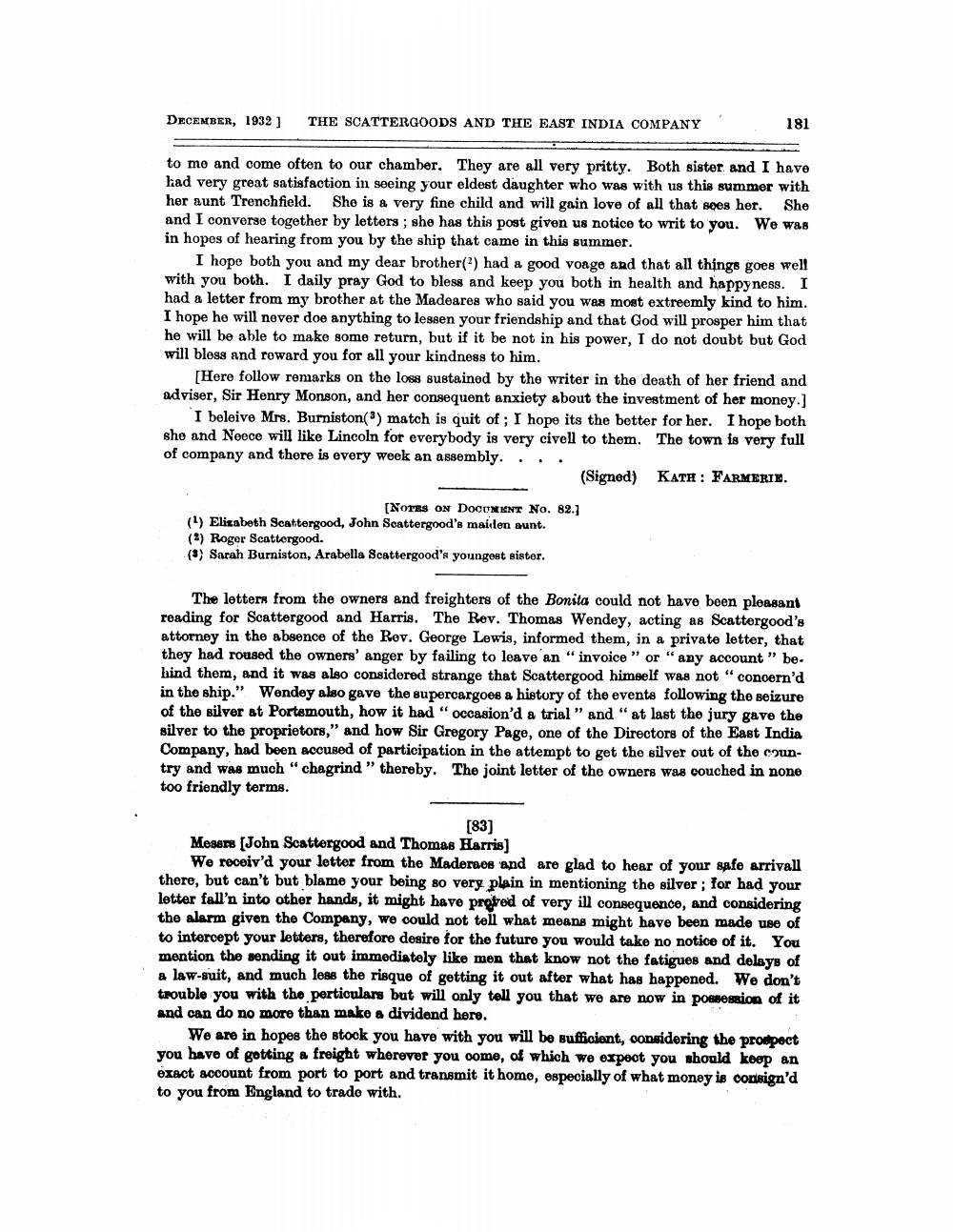________________
DECEMBER, 1932] THE SCATTERGOODS AND THE EAST INDIA COMPANY
to me and come often to our chamber. They are all very pritty. Both sister and I have had very great satisfaction in seeing your eldest daughter who was with us this summer with her aunt Trenchfield. She is a very fine child and will gain love of all that sees her. She and I converse together by letters; she has this post given us notice to writ to you. We was in hopes of hearing from you by the ship that came in this summer.
I hope both you and my dear brother(2) had a good voage and that all things goes well with you both. I daily pray God to bless and keep you both in health and happyness. I had a letter from my brother at the Madeares who said you was most extreemly kind to him. I hope he will never doe anything to lessen your friendship and that God will prosper him that he will be able to make some return, but if it be not in his power, I do not doubt but God will bless and reward you for all your kindness to him.
181
[Here follow remarks on the loss sustained by the writer in the death of her friend and adviser, Sir Henry Monson, and her consequent anxiety about the investment of her money.] I beleive Mrs. Burniston(3) match is quit of; I hope its the better for her. I hope both she and Neece will like Lincoln for everybody is very civell to them. The town is very full of company and there is every week an assembly..
(Signed)
KATH: FARMERIE.
[NOTES ON DOCUMENT No. 82.] (1) Elizabeth Scattergood, John Scattergood's maiden aunt.
(2) Roger Scattergood.
(3) Sarah Burniston, Arabella Scattergood's youngest sister.
The letters from the owners and freighters of the Bonita could not have been pleasant reading for Scattergood and Harris. The Rev. Thomas Wendey, acting as Scattergood's attorney in the absence of the Rev. George Lewis, informed them, in a private letter, that they had roused the owners' anger by failing to leave an "invoice" or "any account" be. hind them, and it was also considered strange that Scattergood himself was not "concern'd in the ship." Wendey also gave the supercargoes a history of the events following the seizure of the silver at Portsmouth, how it had "occasion'd a trial" and "at last the jury gave the silver to the proprietors," and how Sir Gregory Page, one of the Directors of the East India Company, had been accused of participation in the attempt to get the silver out of the country and was much "chagrind " thereby. The joint letter of the owners was couched in none too friendly terms.
[83]
Messrs [John Scattergood and Thomas Harris]
We receiv'd your letter from the Maderaes and are glad to hear of your safe arrivall there, but can't but blame your being so very plain in mentioning the silver; for had your letter fall'n into other hands, it might have proved of very ill consequence, and considering the alarm given the Company, we could not tell what means might have been made use of to intercept your letters, therefore desire for the future you would take no notice of it. You mention the sending it out immediately like men that know not the fatigues and delays of a law-suit, and much less the risque of getting it out after what has happened. We don't trouble you with the perticulars but will only tell you that we are now in possession of it and can do no more than make a dividend here.
We are in hopes the stock you have with you will be sufficient, considering the prospect you have of getting a freight wherever you come, of which we expect you should keep an exact account from port to port and transmit it home, especially of what money is consign'd to you from England to trade with.




